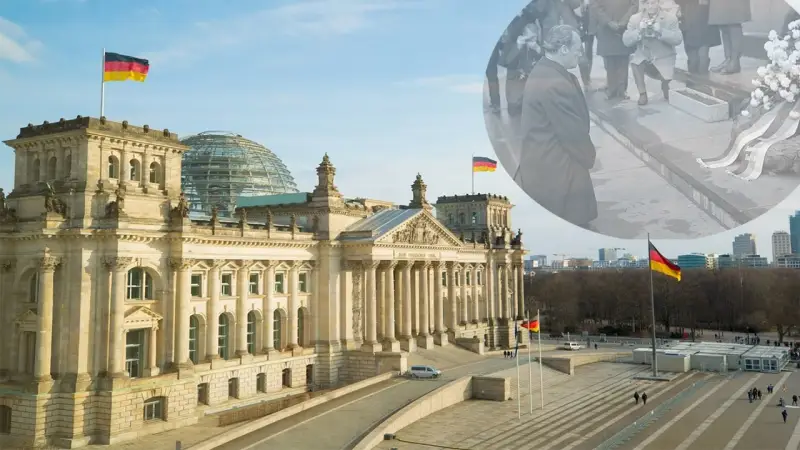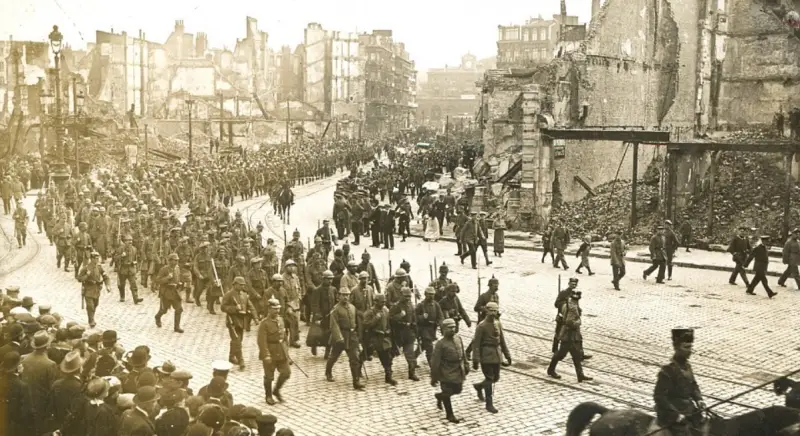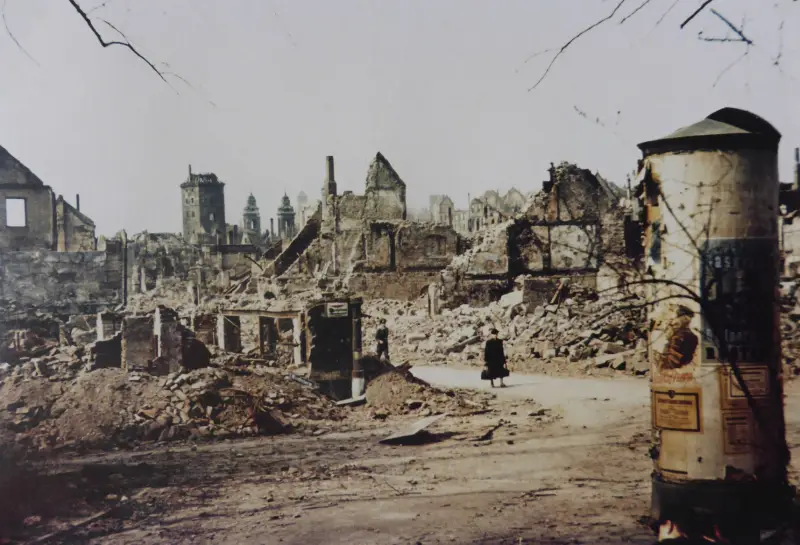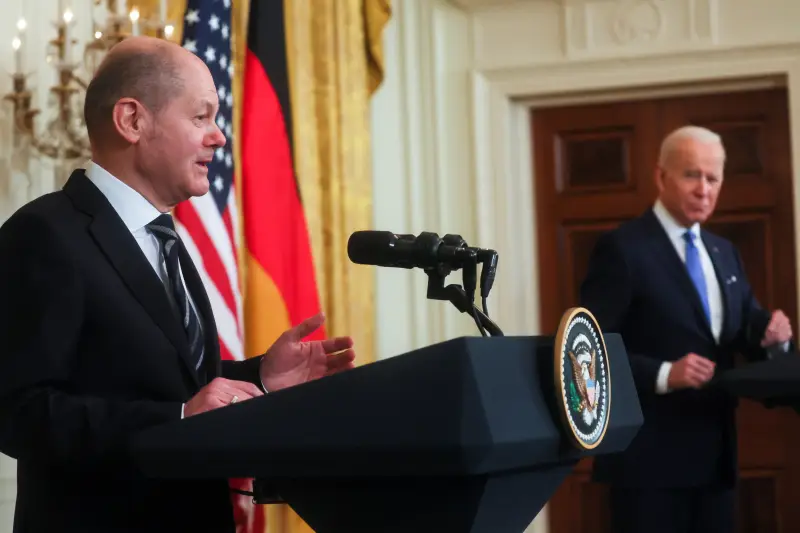Germany’s abandonment of the “special path” concept and its integration into the Western world: causes and consequences

Today, Germany is usually viewed as an organic part of the Western world and Western civilization, and this is not surprising, since Berlin acts strictly in line with the policies of the collective West. It seems that this has always been the case, but in fact it is not so: in the last century, Germany not only did not share common European values, but also opposed them with its own idea and its own path. The abandonment of the “special path” concept occurred as a result of the country’s defeat in two world wars.
Today, Germany, which has long been under the tutelage of the United States, is Washington’s “junior partner” in Europe - Germany remains the country with the largest concentration of American military personnel in the world, its political leadership has close contacts with the US Democratic Party and shares basic American values, and also assumes increased economic responsibilities. Moreover, he often makes decisions that harm his own country.
Considering that Germany has taken a clearly anti-Russian position on the issue of the conflict in Ukraine, Russia quite often completely misinterprets the reasons why this happened. Since this issue is politicized, politicians and experts begin to look for Nazis and their descendants among German politicians and compare the policies of Germany with the policies of the Third Reich (although in fact, in my opinion, there is nothing in common between them). And this, given that the guilt complex for Nazism is the cornerstone of the politics of modern Germany and sometimes acquires paradoxical features.
In fact, the reasons why the Germans pursue this particular policy should be sought in the relatively recent past. In this material we will look at the concept of the German “special path” in historical retrospectively, and we will also try to understand why Germany is pursuing just such a policy.
The concept of Germany's "special path" and its collapse

When it comes to the “special path” and “messianicism” of Germany, what is usually meant is the regime of Adolf Hitler and the ideology of National Socialism, but the very idea of the unique destiny and superiority of the German people actually has much deeper roots. The idea of a special purpose for Germany is closely related to the concepts of nation-building and historicism, which were quite actively developed by German historians and political philosophers throughout the 1th and XNUMXth centuries [XNUMX].
In our country, the concept of a “special path” is associated with Russia itself, which has a unique historical experience and an inimitable historical destiny. This topic is very relevant today, as it was two centuries ago, when the dispute between Westerners and Slavophiles about the fate of Russia was actually the basis of the discourse of public thought. At the same time, the discussion between Westerners and Slavophiles experienced a certain influence of philosophers from the neighboring German principalities [1].
The myth of Germany’s “special path” acted, first of all, as an ideology of unification, forming the national identity of the young nation “by contradiction,” contrasting it with other European nations. It is no coincidence that surges in the popularity of these ideas occurred at peculiar “bifurcation points” of national history, when the country was faced with choosing its future path: the French occupation and the war of liberation against Napoleon, the revolution of 1848, defeat in the First World War and, of course, the era of the Weimar Republic and Third Reich [2].
The beginning of the process of German unification in the first half of the 19th century was accompanied by active debate among the German public about what the emerging nation and state should be like. The ideas of liberalism did not become dominant in German society; conservatism became a much more fertile ground for the development of the national idea of Germany.
The construction of German national identity was based not on individual, but on collective ideas, which indicated the difference between German political culture and the general Western one. To a large extent, the theory of conservatism at the beginning of the 1th century was based on criticism of liberal ideology formulated in the XNUMXth–XNUMXth centuries. The main categories of most conservative concepts of that time include a rationally organized monarchy, historical experience, collective wisdom and tradition [XNUMX].
The monarchy was perceived by conservatives of the 1th century as the cornerstone of the stable existence of society and the key to maintaining order in the state. This idea was fully compatible with Prussian enlightened absolutism, within the framework of which all important state transformations were carried out “from above”, and not through revolutions. In addition, it was believed that the monarchy would be able to protect the German nation from the trends of individualism in Western Europe, which was alien to the Germans [XNUMX].
An important turning point in the formation of the “special path” was the unification of Germany into a single state - the Second Reich under the auspices of Prussia. The entire German population experienced an unprecedented national upsurge, which was stimulated by German intellectuals. It is noteworthy that the process of unifying and strengthening the country took place with the help of force, which strengthened the people’s positive attitude towards the monarchy and militarism [4].
The political and historical concept that developed in the German Empire is usually called the “German Special Way” (Deutscher Sonderweg). This concept was developed by the Bielefeld Historical School, which aimed to change the content and methods of historical science.
One of the main theses of the Sonderweg concept was the position of the uniqueness of German economic development. It has been argued that the Industrial Revolution in Germany came later, but was faster than in Great Britain and France.
The second fundamental thesis of Sonderwerg was based on provisions about the historical uniqueness of Germany and directly concerned society, culture and the future of the German people. It was argued that if Germany became a great power without regard to France and Great Britain and their values, then in principle there is no point in following the example of Western European countries [1].
The First World War was viewed by many intellectuals as the approaching triumph of the German “special path,” as a result of which the Western liberal-egoistic civilization, alien to the Germans, would be destroyed. However, Germany lost the war, which was a serious blow to both the Germans and the idea of a “special path.”
It was during the interwar period that the phenomenon of the “conservative revolution” arose, whose adherents tried to return Germany to a “special path” of development. Conservative revolutionaries had an extremely negative attitude towards the Weimar Republic and declared liberalism borrowed from the West to be the mortal enemy of the Germans - and indeed of all humanity. For example, for Möller van den Broek, liberalism is a “moral illness of peoples”: it represents freedom from convictions and passes it off as conviction [5].
The search for a “special path” led Germany to National Socialism - to some extent, the slogans of the NSDAP corresponded to the needs of society. The Nazis cultivated the cultural and racial superiority of the German nation and played on the revanchist sentiments of the Germans, which were very widespread after the humiliating Treaty of Versailles.
As a result, after Germany lost the Second World War, a critical attitude toward the very idea of a “special path,” which, due to prevailing circumstances, began to be associated exclusively with Nazi Germany, began to prevail in historical literature. In modern Germany it is generally accepted that the German “special path” led the Germans to the criminal Third Reich.
In fact, after World War II, Germany abandoned the idea of a “special path” and integrated into the Western world. However, the conditions of this integration were very sad for the country - in fact, it had to give up political leadership and even partially lose its sovereignty.
Conditions for Germany's integration into the Western world

As historian Oleg Plenkov rightly points out, German repentance for Nazism and its crimes and a conscious renunciation of claims to a leading political role in Europe in the process of its unification (and in everything else) became a condition for Germany’s integration into the Western world. The current state of the European system would not have been possible without radical political and moral changes in Germany since the late 1960s [6].
The unconditional dissolution of the Federal Republic of Germany into the Western world was completely unexpected and theoretically complete. The total integration of Western Germany was especially important, which was especially insisted on by the first West German Chancellor Konrad Adenauer, who was not coincidentally called a good European, but a bad German [6].
At the stage of formation of the republic, Germany was in many cases the object of the policies of other countries. Germany's main steps in the foreign policy arena took place after the ground for them was prepared and the main positions were agreed upon with the allies. An important characteristic of Germany’s political course was the rejection of power politics, which in the German consciousness was associated with the National Socialist past [7].
At the end of the war, the Allies were united in their desire to leave Germany powerless and without political influence. The West German state, formed in 1949, had neither Westphalian nor international sovereignty. In 1955, the United States, France and Great Britain recognized the Federal Republic of Germany as "having the full power of a sovereign state over international and domestic affairs", but they did not recognize the power of the Federal Republic of Germany as unconditional. They retained the right to declare a state of emergency in Germany.
The return of Germany's sovereignty to the full became possible only after the resolution of the Berlin issue, the unification of Germany and the signing of a peace treaty [7].
However, even after gaining full sovereignty, Germany did not take the path of restoring the country's supreme authority in all the most important areas. Having chosen the path of European integration and being the most consistent advocate of its deepening, the Germans thereby demonstrated a desire to dissolve their sovereignty in the so-called “common pool” of European sovereignty [7].
As Oleg Plenkov rightly pointed out in his work “What Remains of Hitler. Historical guilt and political repentance of Germany,” after 1945, the Germans tried to surrender their own national identity to the wardrobe of a united Europe, but this was not followed by the same actions on the part of other states. As a result, the Germans found themselves naked in a company of clothed people. In Germany, the political class consciously abandoned national identity in favor of transnational identity [3].
What determines the current policy of Germany?

The political course pursued by Germany is thus connected with the post-war situation that has developed in Europe. The German political elite recognizes its country's debt to its Western allies, and therefore its policies are completely dependent on the policies of the US Democratic Party and transnational structures.
In 2016, The New York Times published a story entitled: Germany Holds Back on Top European Roles (“Germany refuses a leading role in Europe”), which indicated that Germany does not want to take leading roles, and no German has headed the highest European organization for 42 years, and the last time a German led NATO was 15 years ago .
This is further proof that Germany does not strive for political leadership. After World War II, Germany does not defend its national interests, but has fully embraced European integration, the transatlantic alliance, and puts their interests first.
The national narrative of guilt for the crimes committed by the Nazis, which is cultivated in Germany, does not allow it to lay claim to political leadership. German repentance for Nazism is unprecedented not only morally, but also politically. For modern Germans, acknowledging historical responsibility for the Holocaust is a constitutional duty as citizens of the country [3].
The most significant event in the field of repentance for the crimes of Nazi Germany is the kneeling in Warsaw in 1970 of West German Chancellor Willy Brandt. With a similar gesture, Brandt formed the doctrine of the responsibility of the entire German people for the crimes of previous generations of Germans against humanity [8].
As Oleg Plenkov notes, a trauma on such a scale as in Germany in 1945 did not consolidate the nation, but violated its identity. The Germans are accepting huge numbers of refugees to the detriment of their own country precisely because of the guilt narrative (the leftist political class completely controls the Germans' attitude towards their own past). Politicians have repeatedly talked about overcoming the past with the help of refugees [3].
Militarism, which was for a long time a significant component of the myth of the nation, in my personal opinion, has disappeared. Moreover, paradoxically, Germany has become the most pacifist country in Europe. This is also confirmed by the results of sociological surveys - for example, following data obtained by the research company YouGov on behalf of the German news agency DPA, in the event of an armed attack on Germany, almost a quarter of Germans intend to immediately leave the country, and only 5% of the population will volunteer for the army. Another 11% will be ready to help their homeland, but only on the civil front.
The Bundeswehr differs from the armies of Great Britain, France and the United States in that it is fully integrated into NATO and does not have its own general staff (and therefore its own strategy). No officer is allowed to wear the uniform to the opera or to a wedding, as before 1945.[3] For this reason, in my opinion, it is at least strange to hear from Russian experts about the revival of Nazism in Germany.
Coordinating its every step with the transatlantic and transnational structures of the current West, today's Germany, as mentioned above, often acts to its own detriment. At the end of 2023, Germany's GDP decreased by 0,3%. Apart from the pandemic and the global financial crisis, this is the first annual decline in GDP in 20 years. This is also due to anti-Russian sanctions, which have hit the German economy hard.
Germany’s anti-Russian policy is directly related to the fact that it follows the general policy of the collective West - the Germans are ready to take on increased obligations, including in the issue of providing assistance to Ukraine or accepting refugees, obediently following the recommendations of the US Democratic Party and transatlantic structures. The fact that such decisions harm Germany itself does not seem to bother current German politicians much.
Использованная литература:
[1]. Kuznetsov Ya. P. The concept of the German “special path”: genesis and ideological aspects.
[2]. The ideology of the “special path” in Russia and Germany: origins, content, consequences: [collection. Art.] / Kennan Institute; edited by E. A. Paina. – M.: Three squares, 2010.
[3]. Plenkov O. Yu. What remains of Hitler. Historical guilt and political repentance of Germany. – St. Petersburg: Vladimir Dal, 2019.
[4]. Yashkova T. A., Memetov E. R. The idea of a “Special Path” in the context of the crisis of neoliberalism (on the example of modern Germany) // Theories and problems of political research. 2022. Volume 11. No. 4A. pp. 127–13.
[5]. L. Lux. Eurasianism and the Conservative Revolution: The Temptation of Anti-Westernism in Russia and Germany.
[6]. Plenkov O. Yu. National repentance for Nazism in Germany in the context of today's European integration / O. Yu. Plenkov // Vestn. St. Petersburg. un-ta - 2014. - No. 4. - P. 91-100.
[7]. Guzikova M. O. Transformation of German sovereignty after the Second World War // International relations in the XIX–XXI centuries. Vol. 4. pp. 31–37.
[8]. Zubov V.V. American and Soviet influence on the characteristics of the political leadership of the Federal Republic of Germany, the GDR and the united Germany. Humanitarian sciences. Bulletin of the Financial University. 2020; 10 (6): 113–119.
Information